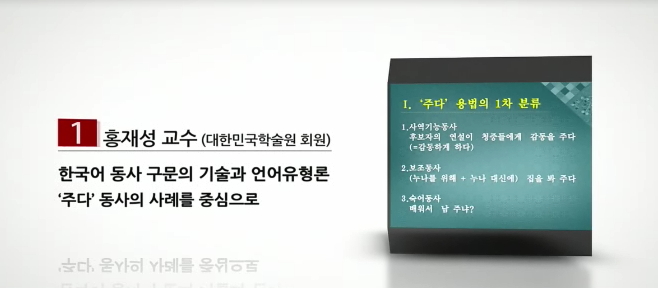The present study investigates some grammatical terms in English and Biblical Hebrew (BH), and their Korean translations that may cause misunderstanding: adjective and its translation hyeongyongsa (형용사), verb and its translation dongsa (동사),...
http://chineseinput.net/에서 pinyin(병음)방식으로 중국어를 변환할 수 있습니다.
변환된 중국어를 복사하여 사용하시면 됩니다.
- 中文 을 입력하시려면 zhongwen을 입력하시고 space를누르시면됩니다.
- 北京 을 입력하시려면 beijing을 입력하시고 space를 누르시면 됩니다.

영어와 성서 히브리어의 몇 가지 문법 용어에 대한 한국어 번역 제안 = A Thought on Some Grammatical Terms and Their Proposed Korean Translations in the Study of English and Biblical Hebrew
한글로보기https://www.riss.kr/link?id=A102917394
- 저자
- 발행기관
- 학술지명
- 권호사항
-
발행연도
2016
-
작성언어
Korean
-
주제어
형용사 ; 동사 ; 동작 동사 ; 상태 동사 ; 성서 히브리어 ; adjective ; verb ; fientive verb ; stative verb ; Biblical Hebrew
-
KDC
230
-
등재정보
KCI등재
-
자료형태
학술저널
-
수록면
148-159(12쪽)
-
KCI 피인용횟수
4
- DOI식별코드
- 제공처
- 소장기관
-
0
상세조회 -
0
다운로드
부가정보
다국어 초록 (Multilingual Abstract)
The present study investigates some grammatical terms in English and Biblical Hebrew (BH), and their Korean translations that may cause misunderstanding: adjective and its translation hyeongyongsa (형용사), verb and its translation dongsa (동사), and stative verb and fientive verb and their translations sangtae dongsa (상태 동사) and dongjak dongsa (동작 동사). The study argues that the grammatical concepts that the English expressions refer to in English and BH differ from the ones that the Korean expressions refer to in Korean.
First, adjectives in English and BH differ from hyeongyongsas in Korean. Morphologically, adjectives decline whereas hyeongyongsas conjugate. Syntactically, adjectives require a copula to be a predicate while hyeongyongsas need an ending. Therefore, rather than translating adjective as hyeongyongsa, it seems better to invent a new expression like sogseongsa (속성사).
Second, the category called verb in many languages including English and BH is generally translated as dongsa in Korean. In English, BH, and many other languages, verbs are understood to conjugate morphologically and to be able to be a predicate syntactically. On the other hand, Korean dongsas should meet an additional condition: the fientive meaning. Therefore, the category of verbs and that of dongsas do not overlap well enough, and the latter is not a satisfactory translation of the former. The study suggests seosulsa (서술사) as an alternative.
Third, verbs are grouped into fientive verbs and stative ones, generally translated as dongjak dongsa and sangtae dongsa. Following the foregoing discussion, dongjak seosulsa (동작 서술사) and sangtae seosulsa (상태 서술사) are to be preferred.
목차 (Table of Contents)
- 1. 들어가는 말
- 2. ‘Adjective’와 ‘형용사’는 다르다
- 3. ‘Verb’는 ‘동사’가 아니다
- 4. ‘상태 서술사’(Stative Verb)와 ‘동작 서술사’(Fientive Verb)
- 5. 나가는 말
- 1. 들어가는 말
- 2. ‘Adjective’와 ‘형용사’는 다르다
- 3. ‘Verb’는 ‘동사’가 아니다
- 4. ‘상태 서술사’(Stative Verb)와 ‘동작 서술사’(Fientive Verb)
- 5. 나가는 말
- 참고문헌(References)
- Abstract
참고문헌 (Reference)
1 김동소, "한국어 특질론" 정림사 2005
2 이관규, "학교 문법론" 월인 2002
3 남기심, "표준 국어문법론" 박이정 2014
4 고영근, "우리말 문법론" 집문당 2008
5 이정민, "언어학사전" 박영사 2000
6 Joüon, Paul, "성서 히브리어 문법" 기혼 2012
7 윤영삼, "Verb는 동사?"
8 Sinclair, Cameron, "The Verbless Clause in Biblical Hebrew: Linguistic Approaches, Linguistic Studies in Ancient West Semitic 1" Eisenbrauns 51-75, 1999
9 Huddleston, Rodney D., "The Cambridge Grammar of the English Language" Cambridge University Press 2002
10 Waltke, Bruce K., "An Introduction to Biblical Hebrew Syntax" Eisenbrauns 1990
1 김동소, "한국어 특질론" 정림사 2005
2 이관규, "학교 문법론" 월인 2002
3 남기심, "표준 국어문법론" 박이정 2014
4 고영근, "우리말 문법론" 집문당 2008
5 이정민, "언어학사전" 박영사 2000
6 Joüon, Paul, "성서 히브리어 문법" 기혼 2012
7 윤영삼, "Verb는 동사?"
8 Sinclair, Cameron, "The Verbless Clause in Biblical Hebrew: Linguistic Approaches, Linguistic Studies in Ancient West Semitic 1" Eisenbrauns 51-75, 1999
9 Huddleston, Rodney D., "The Cambridge Grammar of the English Language" Cambridge University Press 2002
10 Waltke, Bruce K., "An Introduction to Biblical Hebrew Syntax" Eisenbrauns 1990
11 Baugh, Albert C., "A History of the English Language" Routledge 2013
12 Arnold, Bill T., "A Guide to Biblical Hebrew Syntax" Cambridge University Press 2003
13 Joüon, Paul, "A Grammar of Biblical Hebrew" Editrice Pontificio Istituto biblico 2006
14 Seow, C. L., "A Grammar for Biblical Hebrew" Abingdon 1995
15 Trask, R. L., "A Dictionary of Grammatical Terms in Linguistics" Routledge 1993
16 Merwe, C. H. J. van der, "A Biblical Hebrew Reference Grammar" Sheffield Academic Press 1999
동일학술지(권/호) 다른 논문
-
- 대한성서공회
- 이창엽(Changyop Lee)
- 2016
- KCI등재
-
히스기야의 산당 제거(왕하 18:4)와 여로보암의 죄(왕상 12:26-32)
- 대한성서공회
- 이상원(Sang-Won Lee)
- 2016
- KCI등재
-
- 대한성서공회
- 안석일(Suk-il Ahn)
- 2016
- KCI등재
-
- 대한성서공회
- 박영복(Young Bok Park)
- 2016
- KCI등재
분석정보
인용정보 인용지수 설명보기
학술지 이력
| 연월일 | 이력구분 | 이력상세 | 등재구분 |
|---|---|---|---|
| 2026 | 평가예정 | 재인증평가 신청대상 (재인증) | |
| 2020-01-01 | 평가 | 등재학술지 유지 (재인증) |  |
| 2017-01-01 | 평가 | 등재학술지 유지 (계속평가) |  |
| 2013-01-01 | 평가 | 등재 1차 FAIL (등재유지) |  |
| 2010-01-01 | 평가 | 등재학술지 선정 (등재후보2차) |  |
| 2009-01-01 | 평가 | 등재후보 1차 PASS (등재후보1차) |  |
| 2007-01-01 | 평가 | 등재후보학술지 선정 (신규평가) |  |
학술지 인용정보
| 기준연도 | WOS-KCI 통합IF(2년) | KCIF(2년) | KCIF(3년) |
|---|---|---|---|
| 2016 | 0.31 | 0.31 | 0.26 |
| KCIF(4년) | KCIF(5년) | 중심성지수(3년) | 즉시성지수 |
| 0.26 | 0.26 | 0.552 | 0.1 |





 DBpia
DBpia







